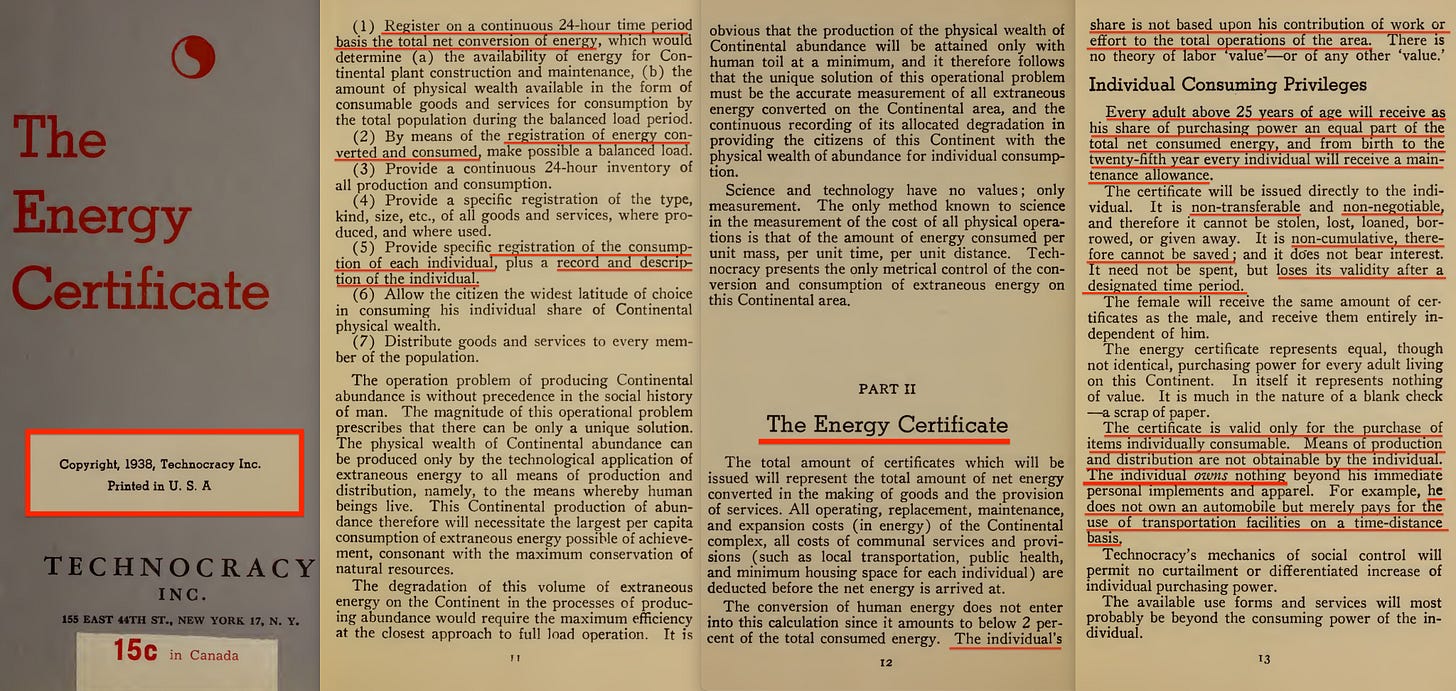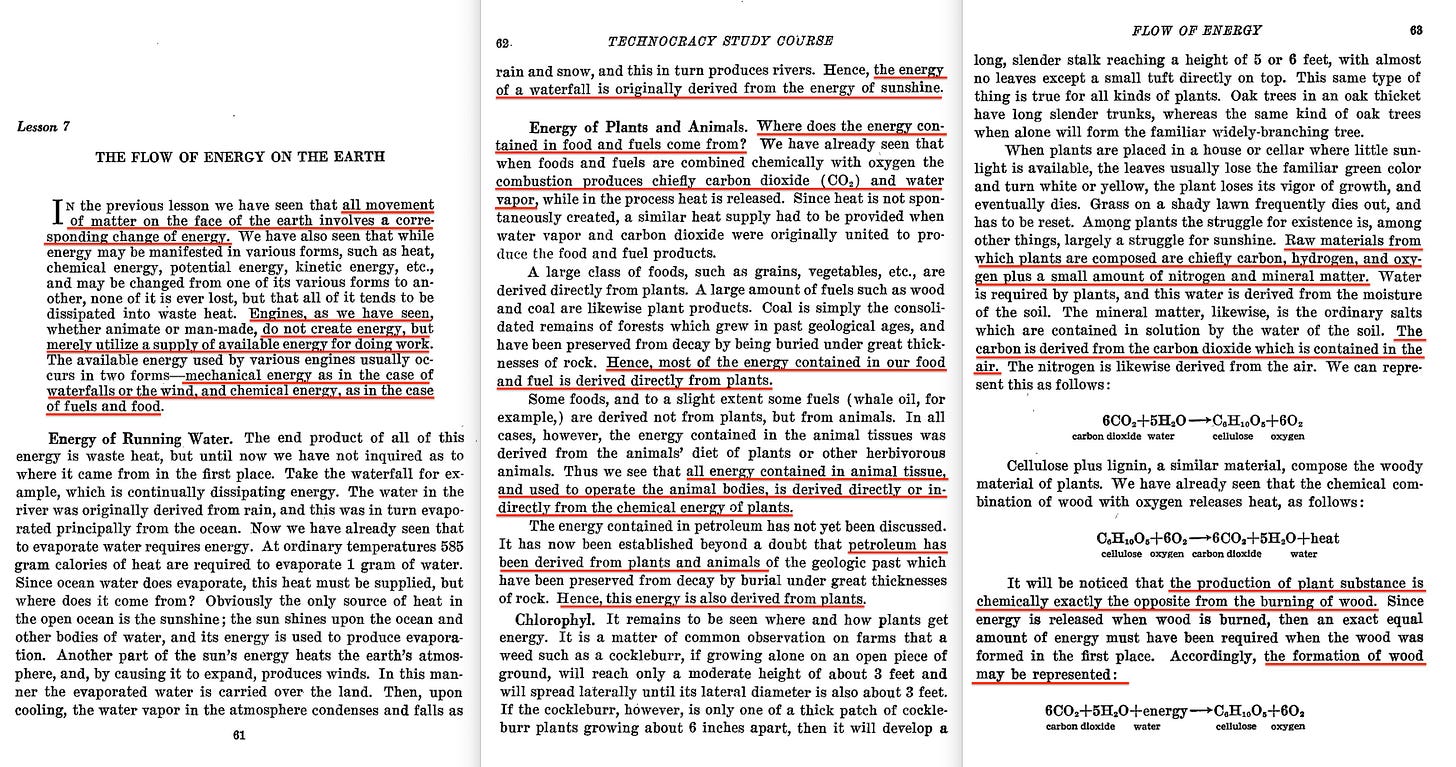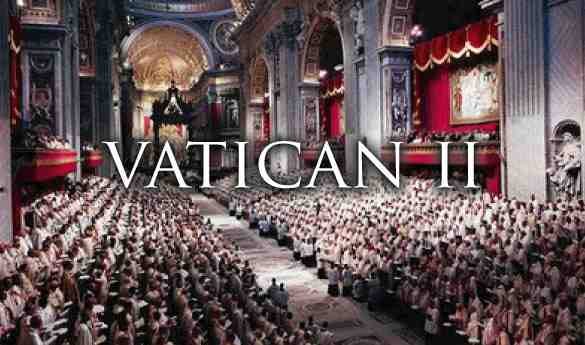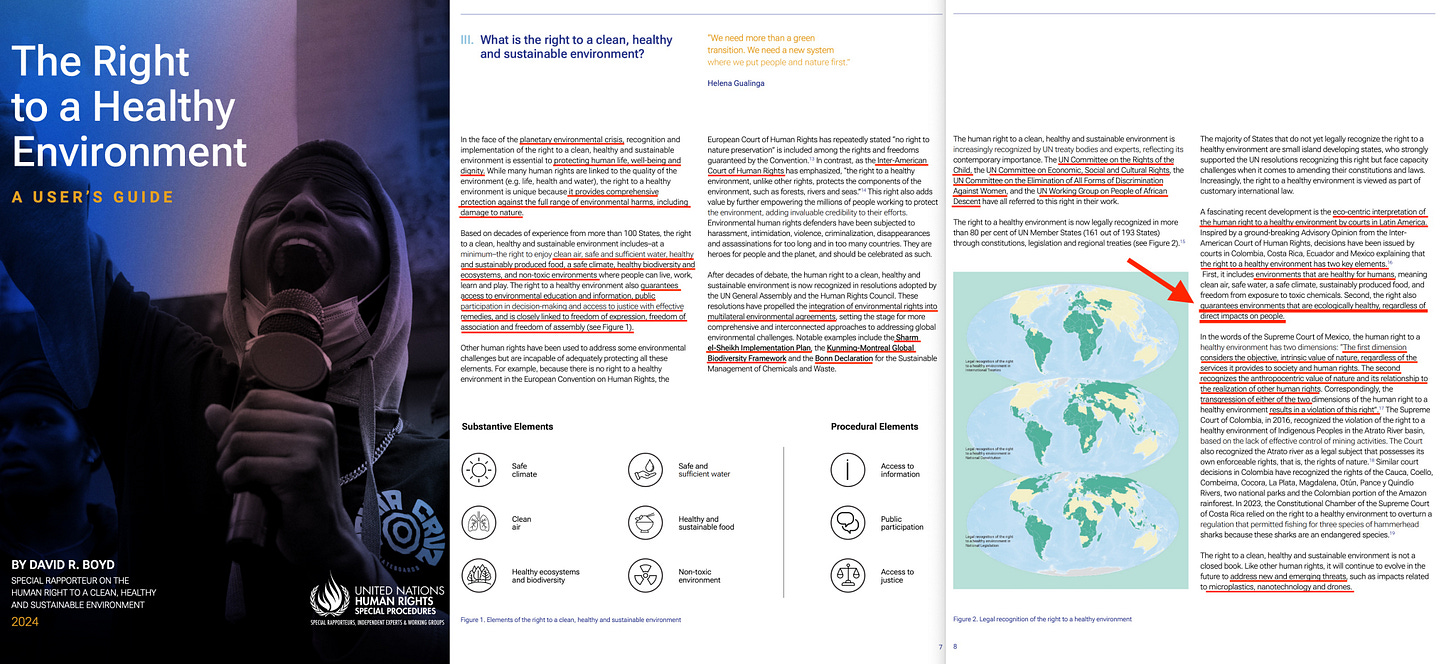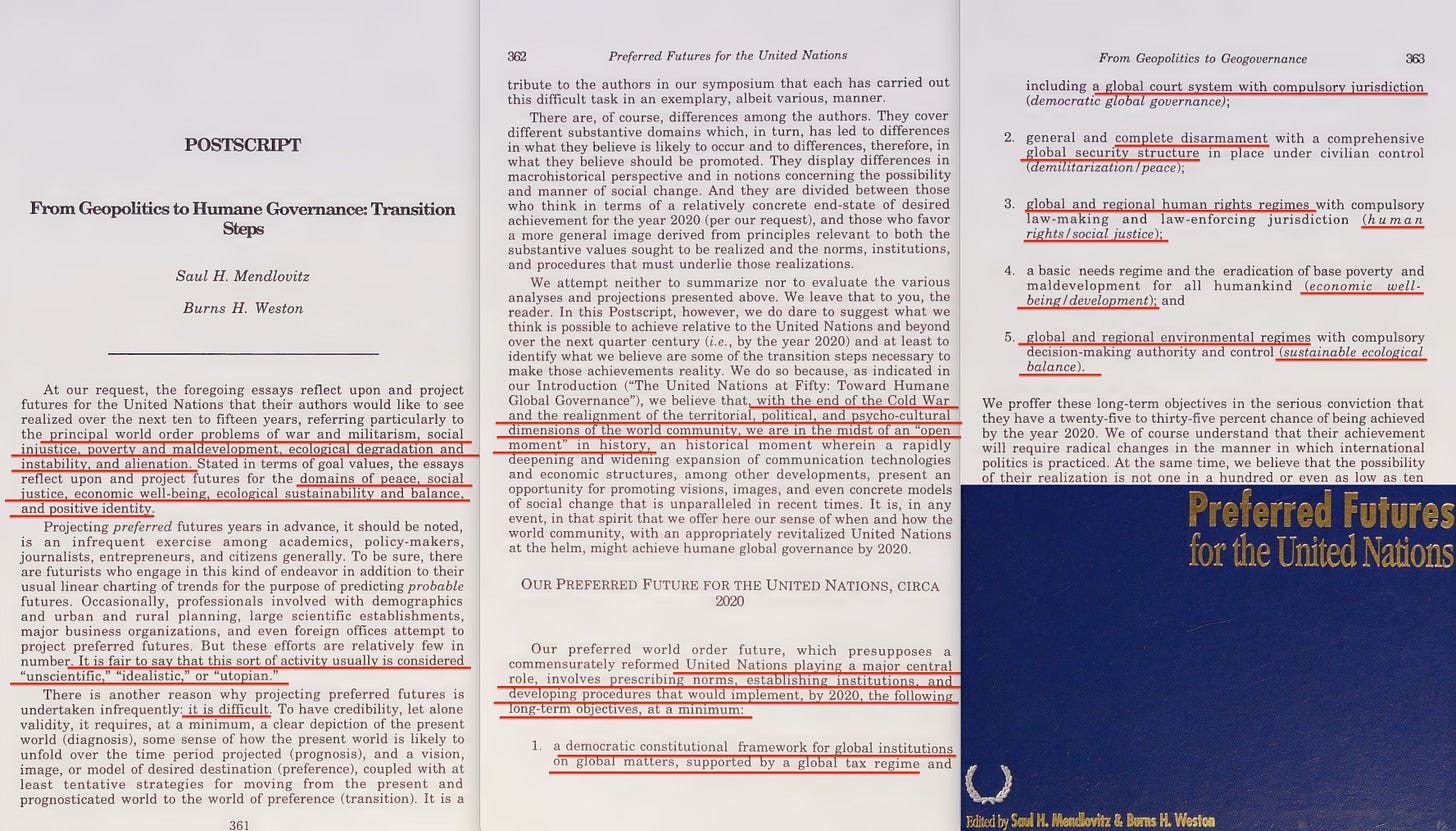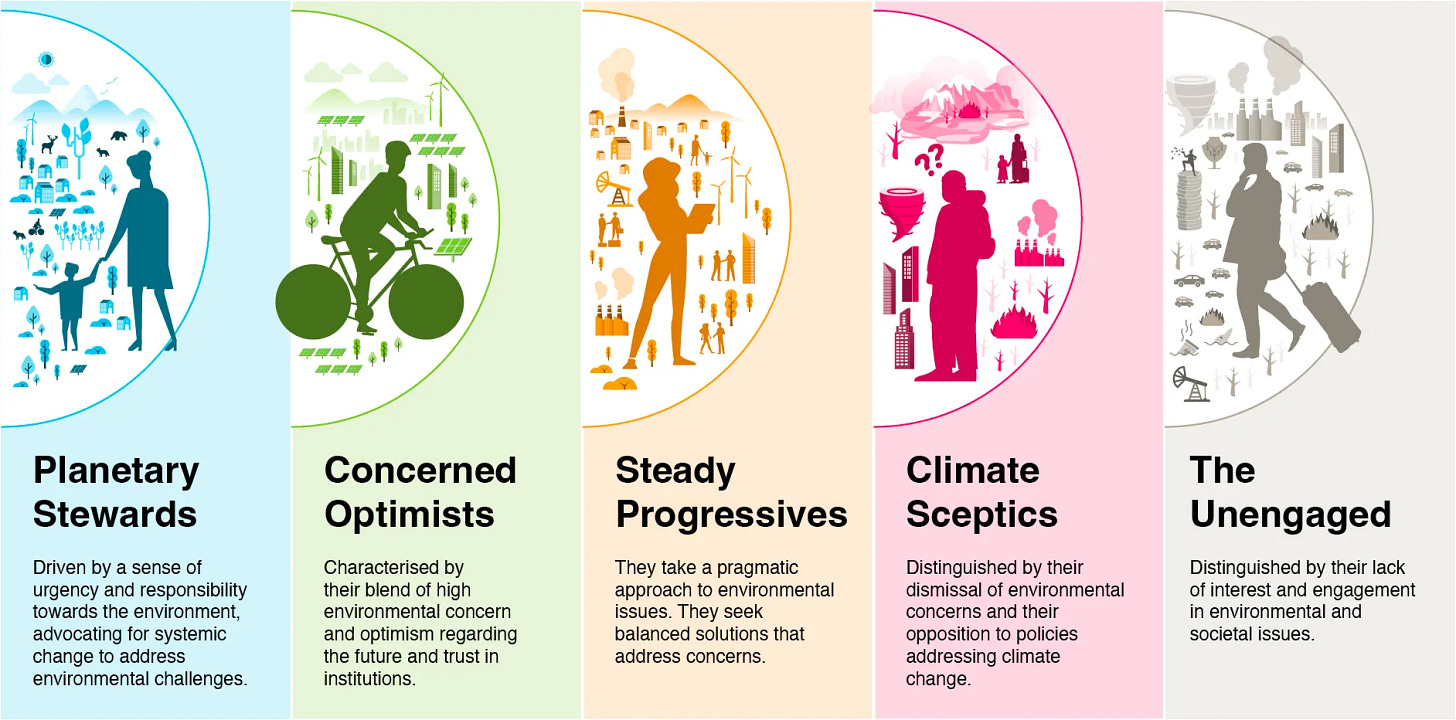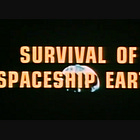When I worked my way through the material on surveillance, one phrase kept recurring — closing the data gap. What they meant was the elimination of blind spots: a lack of real-time surveillance information they sought to close, leaving you nowhere to run — or, in their words, leaving no one behind.
Let’s apply the principle in reverse — by addressing, in quick order, the few remaining topics we never fully covered. The reality is: these all align seamlessly with the structures and trajectories we have already mapped.
Over the past two years, this Substack has systematically explored (among much else):
Ethical globalisation and supranational moral frames
Systems theory, cybernetics, operational research
Technocratic resource-accounting ideologies
Elite networks and cultural control
Scientific and policy mergers
Environmental commodification
Planetary identity shift
Common resource governance
However, a handful of topics were not addressed in full detail. It doesn't hugely matter, because all fundamentally align with the singular synthesis we have gradually arrived at. Nevertheless, for the sake of completeness, these topics deserve a final comment.
And although some of these themes have been indirectly touched upon, let’s now finish the job directly. Because the intent always was to build a case as watertight as possible, which logically makes complete sense. Because though they may be popular, those memes do a terrible job at explaining how it all actually works.
Ergo, by including these final components, attempts to weasel out of the picture should hopefully be preempted — and the full structure made unmistakably clear.
Formed in the 1930s by Howard Scott and a circle of engineers at Columbia University, Technocracy Inc. proposed a radical restructuring of society: replacing politics, markets, and law with energy accounting. In this vision, citizens would no longer participate through voting or markets; instead, their worth, behavior, and entitlements would be measured and regulated according to the amount of energy they consumed and produced within the continental "technate."
Although the movement collapsed publicly after a series of organisational failures and public ridicule, its core concepts — the management of society through resource flows, metrics, and technical standards rather than democratic deliberation — survived. Quietly, technocracy’s logic resurfaced later in frameworks for carbon accounting, sustainability indices, ESG compliance, and planetary boundaries.
Today’s systems of environmental surveillance, financial sustainability scoring, and behavioral nudging trace their lineage to this original project: the vision of a society scientifically managed from above, where human freedom is subordinated to the efficient operation of energy and resource systems.
2. League of Industrial Democracy3 / Intercollegiate Socialist Society45
Founded in 1905 as the Intercollegiate Socialist Society (ISS) and later renamed the League of Industrial Democracy (LID), this organisation sought to replace capitalism not through violent revolution, but through a gradual transformation of society into a rationally planned, democratically managed industrial commonwealth. The focus was not merely on ownership of production, but on engineering society itself — reshaping education, labor, and governance to fit a new, scientifically managed social order.
Rather than advocating traditional Marxist class struggle, the LID promoted gradualism: infiltrating institutions, academia, and policymaking bodies to cultivate a generation of elites who would guide the transition to a technocratic form of socialism. Through its ties to universities, labor unions, and early progressive movements, the LID helped lay the intellectual groundwork for trisectoral governance — the blending of public, private, and nonprofit sectors under coordinated managerial systems.
Though it faded from public prominence, the League’s emphasis on planning, economic democracy, and scientific administration prefigured later global governance structures, where democratic rhetoric masks the steady replacement of political choice with expert-driven systems control.
3. RAND Corporation and Systems Analysis
Founded post-WWII, RAND Corporation institutionalised the application of systems analysis to public policy, national defense, and later civil sectors. RAND played a pivotal role in normalising the idea that complex human and geopolitical problems could be solved by predictive models and cost-benefit calculations, bypassing traditional political deliberation.
4. Cybernetics and Governance (Norbert Wiener, 1948)6
Norbert Wiener's ‘Cybernetics: Or Control and Communication in the Animal and the Machine’ framed governance as feedback-driven systems management, applicable to humans and society alike. This blueprint directly influenced later Earth systems models, AI governance initiatives, and public health surveillance mechanisms — shifting the political focus from persuasion to algorithmic control.
5. The Tavistock Institute and Post-War Social Engineering7
Originally established to study shell shock during WWI, Tavistock evolved into the foremost center for behavioral control and mass consensus formation. Its techniques — group dynamics, stress testing, narrative control — laid the foundation for soft governance: shaping populations through information management rather than overt political coercion, similar to Bogdanov’s Proletkult.
6. Operational Research (OR) and Systems Optimisation
Born in WWII military logistics, Operational Research applied quantitative systems analysis to resource deployment. After the war, it spread into civilian life, embedding systems thinking into education, urban planning, public health, and eventually environmental management. OR's logic helped normalise the view of society itself as an optimisable machine.
7. The OECD and Behavioral Governance
The OECD became a key node for translating systems governance into ‘soft law’, best practices, and behavioral policy nudges. From education standards to sustainable development indicators, the OECD quietly shaped national policies to align with supranational systems management without needing formal treaties.
8. IIASA and East-West Systems Convergence
The International Institute for Applied Systems Analysis (IIASA), founded in 1972, created a Cold War–era bridge between East and West to harmonise environmental and economic systems modeling. IIASA helped to globalise input-output modeling techniques, environmental indicators, and predictive planetary management strategies beyond ideological divides.
9. The Macy8 and Pugwash9 Conferences
The Macy Conferences (1946–1953) birthed cybernetics as a transdisciplinary field, while the Pugwash Conferences (post-1957) promoted global scientific collaboration for peace and stability. Both served to entrench the authority of technical elites in shaping planetary governance under the guise of managing existential risks.
10. The Cambridge Apostles and the Cultural Architecture of Systems Theory
Influential secret societies like the Cambridge Apostles seeded elite networks committed to reshaping culture and politics along collectivist, managerial lines. Several members went on to influence key institutions in education, intelligence, and governance, embedding the logic of systemic planning at the highest levels.
11. Vatican II and the Ethics of Supranationalism
The Second Vatican Council (1962–65) reframed Catholic doctrine towards human dignity and global solidarity, subtly endorsing supranational ethical frameworks. This moral shift paralleled secular developments in ‘planetary stewardship’ and helped religious institutions align with the broader global governance project.
12. Integral Humanism (Jacques Maritain)10
Maritain’s Integral Humanism (1936) provided an intellectual bridge between Catholic social teaching and secular human rights discourse. His vision of cosmopolitan democracy, infused with spiritual values, became foundational for the postwar UN system and early global citizenship education models.
13. Global Brain and the Noosphere Concept (Vernadsky, Teilhard de Chardin)
Visionaries like Vladimir Vernadsky and Pierre Teilhard de Chardin introduced the idea that human consciousness forms a planetary noosphere — a collective mind evolving alongside the biosphere. This concept, later echoed in the ‘Global Brain’ and AI-driven planetary governance discourses, framed centralised data governance as not merely strategic, but as evolutionary destiny.
14. The 'Common Heritage of Mankind' Doctrine
Formulated through UN treaties on deep-sea mining, Antarctica, and outer space, this principle reframed natural resources beyond national borders as global commons. It justified the creation of supranational governance structures to manage ‘shared’ resources, laying the intellectual groundwork for binding environmental treaties and the regulation of sovereign resources.
15. Science-Policy Fusion: UNESCO's Science Contracts
In the postwar decades, UNESCO pioneered efforts to formalise the binding of scientific knowledge to policymaking. Science Policy programs during the 1960s–70s transformed science from a tool of national progress to an instrument of supranational governance, deepening the ‘expert-manager’ ethos now dominant in global institutions.
16. Legal Codification of Nature's Rights
Beginning with the 1972 Stockholm Declaration and accelerating through the Earth Charter (2000), a new legal philosophy emerged: nature itself could possess rights equal to or even exceeding human sovereignty11. Ecuador and New Zealand became early adopters, while UN bodies pushed for the universal adoption of ‘Earth jurisprudence’, advancing biosphere management at the expense of individual autonomy.
17. Cultural Engineering through Global Citizenship Education
UNESCO's Education for Sustainable Development (ESD) initiatives, since the 1990s, have sought to shift individual identity from nation-based citizenship to global citizenship. Through school curricula, these programs aim to reshape loyalties and perceptions, encouraging populations to view governance and responsibilities through a planetary rather than a political lens.
18. Early Climate Governance as Financial Commodification
UNCTAD's early 1990s ‘Combating Global Warming’ reports reframed atmospheric gases as tradable commodities, pioneering emissions trading markets before meaningful public debate. This monetisation of planetary processes enabled financial institutions to integrate environmental governance with speculative finance — a convergence that became critical to the development of modern ESG and carbon credit systems.
19. Post-1975 Shift Toward Preventive Governance
Following the Club of Rome's Limits to Growth (1972) and subsequent IIASA modeling efforts, global governance theory shifted from crisis response to crisis prevention. The emerging doctrine of anticipatory governance emphasised predictive modeling, early-warning systems, and scenario planning as ethical imperatives for managing planetary risks. By reframing uncertainty as something manageable through system-wide surveillance and intervention, institutions justified preemptive policymaking and resource redistribution on a global scale. This shift laid the foundation for concepts like planetary boundaries, pandemic preparedness, and climate risk governance, where control measures precede democratic consent.
20. Role of NGOs and Foundations (Ford, Rockefeller, Carnegie Shaping the Supranational NGO Landscape)
Throughout the 20th century, major private foundations — particularly Ford, Rockefeller, and Carnegie — played a pivotal role in constructing the NGO infrastructure that would later operationalise supranational governance agendas. By funding transnational research bodies, environmental coalitions, public health alliances, and human rights organisations, these foundations created a para-political class of experts and activists positioned above traditional democratic accountability. NGOs, in turn, became intermediaries between populations and global governance institutions, embedding ethical, environmental, and health norms into national policies through soft power rather than formal political processes.
21. World Order Models Project (WOMP, 1960s–1970s)1213
The World Order Models Project (WOMP), initiated in the late 1960s under the leadership of figures like Saul Mendlovitz, explicitly called for the redesign of the international order. WOMP advocated for new legal, political, and ethical frameworks that would transcend nation-states, proposing forms of global democracy and world authority anchored in systems theory and universal ethics. Although WOMP itself did not produce a formal global constitution, its proposals significantly influenced later developments in global governance discourse, including the strengthening of international courts, the promotion of global citizenship frameworks, and the establishment of environmental governance compacts.
22. Full Fusion of Finance and Governance Post-2008
The 2008 financial crisis catalysed the full-scale fusion of financial markets with global governance initiatives. In its aftermath, supranational bodies such as the G20, IMF, and UN agencies quickly integrated financial risk management with environmental sustainability, health resilience, and social equity targets. ESG frameworks, climate risk disclosures, and pandemic preparedness bonds institutionalised the convergence of private finance with public regulatory goals. This integration effectively subordinated democratic decision-making to transnational financial steering, embedding governance within liquidity flows, debt instruments, and investment mandates under the guise of systemic risk management.
Yet even these components, taken individually, risk understating the full consolidation that occurred behind the scenes. The deeper reality is that the same handful of institutions, financial actors, scientific bodies, and elite networks systematically cross-pollinated across sectors, ensuring that no critical domain—whether finance, environment, health, or information—could remain outside their collective managerial architecture. Far from being independent developments, the movements charted above formed an integrated lattice: a preconfigured administrative grid for total systems governance.
IIASA, the International Institute for Applied Systems Analysis, quietly united RAND Corporation technocrats and Soviet cyberneticians at the height of the Cold War—embedding environmental surveillance, resource modeling, and demographic management into a single East-West platform. Simultaneously, the Rockefeller Foundation not only funded early public health surveillance prototypes but also sponsored Tavistock-affiliated projects in psychological systems control, merging mass behavioral management with emerging biosecurity doctrines. Meanwhile, the Club of Rome's Limits to Growth simulations were directly tied into UN environmental governance initiatives, while Mikhail Gorbachev’s later Earth Charter Movement fused these systems logics into an ethical global constitution — an effort openly backed by Maurice Strong and aligned with UNESCO's cultural reprogramming mandates.
Behind the environmental, financial, and health systems a planetary administrative grid quietly solidified: NATO and UNESCO jointly launched Earthwatch to establish continuous environmental monitoring; ESG scoring and the OECD's behavioral governance standards folded national economic management into a planetary finance-regulatory system; and the World Bank’s Pandemic Emergency Financing Facility linked outbreak surveillance to speculative sovereign debt instruments, ensuring that future governance actions could be triggered not by democratic will but by risk algorithms and liquidity conditions. Each sector was synchronised through predictive metrics, early-warning infrastructures, and legal conditionalities that collectively replaced public policy with anticipatory managerial steering.
This is not a scattered conspiracy of ideas. It is a rigorously engineered systems convergence—planned, funded, trialed, and implemented by overlapping networks of financiers, technocrats, behavioral engineers, environmental modelers, and supranational bureaucrats over the course of a century. The missing connections are not ancillary; they are the very ligaments that hold the emerging architecture together. Without grasping the depth of this cross-sectoral fusion, the scale and permanence of what is being constructed cannot be fully understood.
Conclusion
Over the past two years, the body of work assembled here has traced the gradual emergence of a planetary governance system — not built through sudden conquest, but through the steady aggregation of ethics, science, surveillance, financial instrumentation, and cultural engineering.
The missing topics addressed here only reinforce the solidity of the overall case. They are not deviations, exceptions, or isolated experiments; they are structural reinforcements that slot precisely into the architecture already laid bare.
Each element fits into a broader evolutionary continuum:
Technocratic dreams of energy accounting grew into environmental surveillance and ESG regulation.
Cybernetic governance models evolved into algorithmic steering of populations.
Behavioral science innovations were institutionalised through education systems, nudging strategies, and public health governance.
Scientific and ethical fusion legitimised the transfer of sovereignty from the political realm to the technocratic.
Financial convergence ensured that capital flows themselves would discipline populations through risk modeling, credit scoring, and sustainability-linked investment mandates.
Planetary identity construction replaced national loyalty with allegiance to global systems of resource management, health security, and behavioral compliance.
The institutional players — from RAND to UNESCO, IIASA to the OECD, the Vatican to the UN agencies — all participated, knowingly or not, in the weaving of this seamless governance fabric.
Philosophical frames, whether Catholic integralism or noospheric evolution, provided the moral and metaphysical justifications needed to normalise the end of sovereignty. NGOs, transnational foundations, and expert networks operationalised these theories into law, education, and daily life without overt confrontation, minimising friction through cultural and ethical framing.
The result is a system that is self-reinforcing across domains:
Surveillance is justified by health.
Health is governed by sustainability.
Sustainability is priced by finance.
Finance is regulated by behavioral compliance.
Compliance is moralised by ethics.
Ethics are legitimised by science.
Science is framed by planetary stewardship.
There is no clear exit point from this structure because each domain now feeds back into the others, forming a closed anticipatory governance loop that disciplines future risks before democratic processes can meaningfully engage with them.
Everything is, in effect, justified in the name of saving the planet.
Outline of the Emerging New World Order
The world order now emerging is defined not by traditional geopolitical conquest, but by total system management. Its structure is characterised by:
Supranational Ethical Sovereignty: Political sovereignty is subordinated to supranational moral obligations framed around human rights, planetary survival, and public health imperatives.
Predictive and Preventive Governance: Management of populations and resources shifts to anticipatory models — systems seek to prevent risks before they occur through predictive analytics, environmental sensors, and health surveillance networks.
Planetary Resource Accounting: Natural resources, atmospheric gases, biodiversity, and even human behavior are measured, priced, and traded within a framework of global commons management.
Financial-Governance Integration: Central banks, asset managers, and international institutions (IMF, BIS, World Bank) integrate sustainability and resilience metrics into financial systems, embedding governance within liquidity, debt, and investment structures.
Behavioral Compliance through Nudging and Incentives: Citizens are governed not primarily by overt law but by engineered incentives and social-credit-style systems that reward compliance with planetary governance objectives.
Continuous Surveillance Infrastructure: Seamless, real-time data collection across health, environment, movement, and finance ensures that governance is not reactive but continuously adjusted based on predictive modeling.
Cultural Realignment: Education, media, and cultural institutions systematically deconstruct national, familial, and religious identities in favor of global citizenship, planetary solidarity, and bioethical responsibility.
Legal Reframing: New legal constructs elevate the rights of nature, future generations, and non-human entities, displacing traditional human political agency as the primary axis of sovereignty.
No Exit: As surveillance, finance, behavioral science, and legal frameworks converge, the capacity for democratic populations to meaningfully opt out or reverse course is systematically closed off.
This New World Order — built silently over a century through ethics, systems theory, and administrative convergence — does not seek consent in the traditional sense. Instead, it is emerging as a self-evident managerial necessity, positioned as the only responsible way to manage complex global risks. And because it is framed as ethically unavoidable, scientifically validated, financially incentivised, and culturally reinforced, it becomes almost invisible to contest except at the margins.
Its true architecture is obscured inside a Black Box of predictive algorithms, cross-sectoral coordination, and opaque supranational governance — making accountability impossible and reversal unthinkable.
Meanwhile, the entire apparatus is Cloaked in Care: a moral narrative of protection, responsibility, and survival, ensuring that the deeper coercion is not seen as domination, but as virtue.
The system is now largely complete. The final step is its normalisation — the gradual internalisation of seamless governance as the unquestionable baseline condition of modern life.
And having now mapped the structural architecture, we can now turn to one of its most candid acknowledgments in elite literature: Henry Kissinger’s World Order.
Kissinger’s World Order and the Completion of the System
Henry Kissinger’s World Order (2014) articulates a core concern: that the Westphalian system of sovereign nation-states is no longer capable of managing the systemic risks posed by globalisation, technology, finance, health crises, and environmental collapse. Increasing interdependence, he argues, demands a deliberate reconstruction of global governance — including a reinterpretation of sovereignty, the establishment of universal ethical and legal frameworks, and the construction of seamless systems for information sharing, surveillance, and financial coordination. Without such measures, Kissinger warns, the world risks systemic fragmentation and perpetual crisis.
Yet what Kissinger frames as a necessary future correction aligns almost exactly with the structures already documented in this thesis. The need for global governance was not a reactive development but the culmination of a century-long construction: technocracy, cybernetics, behavioral science, systems theory, financial governance, and supranational ethics were deliberately developed to anticipate and manage the very crises Kissinger describes.
Kissinger emphasises that sovereignty must yield to survival imperatives in an interdependent world. This thesis shows that sovereignty has already been steadily eroded, supplanted by supranational legal norms (environmental rights, human rights, bioethics) and operationalised through NGOs, international foundations, and public-private partnerships. Where Kissinger demands universal ethical frameworks, this work traces the deliberate crafting of planetary ethics — Earth Jurisprudence, Integral Humanism, global health ethics — to serve exactly that purpose. Where he calls for seamless surveillance and data integration, this work maps the anticipatory systems that now monitor health, environment, finance, and behavior. Where he calls for financial systems to support governance, this work documents how ESG frameworks, carbon markets, and pandemic bonds have fused finance with administrative control.
Similarly, Kissinger stresses anticipatory governance — managing risks before they metastasise — as essential. This thesis shows how post-1975 systems theory, particularly through IIASA and the Club of Rome, embedded predictive management into environmental, financial, and health policy decades before public crises made it visible. He urges the replacement of national loyalties with global citizenship; this work outlines how UNESCO and associated networks systematically re-engineered identity toward planetary allegiance. Finally, while Kissinger implies the need for elite stewardship, this work exposes how elite institutions — RAND, IIASA, the Ford and Rockefeller Foundations, UNESCO — have already bypassed democratic processes in favor of anticipatory administrative governance.
Thus, what Kissinger presents as a looming necessity is in fact an operational reality. The technocratic, cybernetic, ethically moralised, financially integrated, surveillance-based system he describes has already been built. Surveillance justifies health interventions; health policy drives environmental governance; environmental governance is priced through finance; finance enforces behavioral compliance; behavior is moralised through ethics; ethics are legitimated by global risk narratives; and risk narratives are stabilised through predictive modeling — all operating outside traditional democratic accountability.
The result is a seamless anticipatory management system: real-time steering of populations and resources based on modeled future risks. Sovereignty has been redefined. Democracy has been rechanneled into participatory compliance. Identity has shifted from national citizen to planetary stakeholder. Finance has become an enforcement mechanism. Surveillance has been naturalised as ethical necessity. Each domain now reinforces the others, forming a closed, self-reinforcing governance loop.
This is the world order Kissinger called for — and the world order this thesis shows was already systematically under construction, long before the crises later used to justify its final normalisation.
Let’s also briefly bring in a few other closely aligned titles,
1. H.G. Wells – The Open Conspiracy: Blue Prints for a World Revolution (1928)
In The Open Conspiracy14, H.G. Wells lays out an explicit blueprint for the creation of a world government managed by scientific elites. He advocates bypassing democratic processes entirely in favor of a rational, technocratic order devoted to ‘world reconstruction’ and ‘collective survival’. Far from a utopian daydream, Wells envisions an organised cadre of enlightened elites gradually building parallel structures to replace national governance. His plan aligns perfectly with the gradual, technocratic, ethics-driven architecture mapped in this thesis, making Wells one of the earliest and clearest proponents of the supranational governance paradigm later operationalised by UNESCO, IIASA, and the UN agencies.
2. Bertrand Russell – The Impact of Science on Society (1952)
In The Impact of Science on Society15, Bertrand Russell bluntly describes how science, psychology, and education could be used to shape mass behavior, stabilise populations, and engineer social outcomes. He discusses the potential for pharmacological, psychological, and informational techniques to replace traditional forms of governance, advocating for a scientifically managed society where control is exerted subtly but absolutely. Russell’s pragmatic framing of behavioral manipulation dovetails precisely with the behavioral governance, anticipatory control, and cultural engineering strategies outlined across this thesis, providing a cold rationalisation for the managerial paradigm that has since been normalised.
3. Jacques Ellul – The Technological Society (1954)
While more critical than prescriptive, Jacques Ellul’s The Technological Society16 offers a chilling analysis of how technological systems, once established, evolve beyond human control. He shows that technological ‘progress’ becomes an autonomous force, restructuring society, politics, and even human thought to fit its imperatives. Ellul’s thesis underpins the reality described here: that once systems of surveillance, finance, education, and governance are installed, they form a self-reinforcing anticipatory loop that becomes nearly impossible to dismantle. His work strengthens the argument that the emerging global system operates according to the autonomous logic of systems optimisation, not merely elite conspiracy.
4. Zbigniew Brzezinski – Between Two Ages: America's Role in the Technetronic Era (1970)
In Between Two Ages17, Zbigniew Brzezinski foresees the emergence of a ‘technetronic society’, where human behavior is increasingly shaped and controlled through technology, data flows, and predictive systems. He predicts the rise of a global elite class capable of managing the world not through overt political control but through information systems, psychological techniques, and scientific governance. This aligns directly with the thesis presented here, which demonstrates that the structures of global surveillance, behavior engineering, systems governance, and financial control were deliberately assembled to create exactly the anticipatory, seamless management framework Brzezinski outlined decades ago.
5. Trilateral Commission – The Crisis of Democracy (1975)
In The Crisis of Democracy18, commissioned by the Trilateral Commission and authored by Crozier, Huntington, and Watanuki, the report bluntly states that the developed world faces a crisis not of authoritarianism, but of ‘excess democracy’. It warns that the traditional democratic mechanisms were producing too much citizen participation, overwhelming governments’ ability to govern effectively. The solution, the report implies, is a reduction in democratic expectations and an increase in expert-driven governance. This matches the conclusions of this thesis precisely: that a managed, supranational system was built to bypass democratic volatility, to steer populations through anticipatory systems, behavioral incentives, and administrative frameworks immune to electoral disruption.
6. David Rockefeller – Memoirs (2002)
In his Memoirs19, David Rockefeller candidly acknowledges his role — and that of his family’s foundations — in building supranational governance structures, promoting economic globalisation, and nurturing a ‘secret cabal’ committed to planetary management. He frames these efforts as noble and necessary responses to growing global interdependence. Rockefeller’s firsthand confirmation of deliberate elite coordination between finance, governance, science, and culture directly corroborates the multi-domain construction of the anticipatory governance system mapped throughout this work. His admission removes any lingering doubt that the convergence of these sectors into a unified management system was not accidental but intentional.
7. Jacques Attali – A Brief History of the Future (2006)
In A Brief History of the Future20, Jacques Attali describes the progressive emergence of a globalised managerial society ruled not by nation-states but by a network of mobile elites managing finance, technology, surveillance, and humanitarian norms. He outlines the rise of ‘nomadic elites’ and the slow dissolution of traditional sovereignty under the weight of environmental, financial, and health crises, all overseen by an unelected, technocratic class. This vision aligns almost perfectly with the system outlined in this thesis: supranational governance anchored in predictive modeling, cultural re-engineering, financial enforcement, and the gradual normalisation of continuous behavioral management — a system framed not as coercion but as evolutionary necessity.
8. Aldous Huxley – Brave New World Revisited (1958)
In Brave New World Revisited21, Aldous Huxley reflects on the accelerating realisation of his earlier dystopia. He warns that population conditioning through education, media, pharmacology, and psychological manipulation is proceeding faster than he ever predicted. Huxley discusses the concept of ‘voluntary servitude’, where people willingly submit to control in exchange for comfort and safety — perfectly echoing the cultural and psychological dynamics central to anticipatory governance and behavioral compliance discussed in this thesis. His insights reinforce the critical role of soft power and internalised consent in sustaining the emerging planetary management system.
9. Julian Huxley – UNESCO: Its Purpose and Its Philosophy (1946)
In UNESCO: Its Purpose and Its Philosophy, Julian Huxley explicitly argues that UNESCO’s role is not merely educational but transformational — to foster the creation of a single world culture based on evolutionary humanism. Huxley advocates for the gradual erosion of nationalistic loyalties and the promotion of a global ethos rooted in science, evolutionary ethics, and planned cultural development. This early blueprint aligns directly with the thesis mapped here: the use of cultural engineering, educational frameworks, ethical universalism, and scientific legitimacy to construct a seamless supranational governance system where individual and national agency is subordinated to planetary management objectives.
Thus, the world order solidifying today — predictive, managerial, surveillance-based, financialised, ethically engineered, and culturally homogenised — is not a spontaneous evolution. It is the logical culmination of a structured, conscious project stretching back more than a century, with Huxley’s blueprint functioning as its deepest ethical core.
Every major source cited — from Wells to Russell, Ellul to Brzezinski, Rockefeller to Attali — ultimately converges on the same architecture outlined throughout this Substack: a seamless system where technocratic governance, anticipatory surveillance, ethical reengineering, financial steering, and cultural realignment fuse into a planetary management regime. What they described in fragments, this body of work has mapped in full.
This new order does not merely manage nations; it manages the planet itself. Through the metaphor of ‘Spaceship Earth’, humanity is reframed as a collective crew whose survival depends on coordinated resource management, continuous monitoring, and unified governance of the biosphere. Within this framework, sovereignty, individuality, and dissent are no longer seen as virtues but as liabilities — anomalies to be reconditioned or removed for the sake of systemic stability.
Total management of Spaceship Earth is not a rhetorical ambition; it is the operational logic now quietly embedded across finance, law, surveillance, education, culture, and even spiritual narratives. The machine has been built. It now stands ready, waiting only for universal internalisation — for the world’s populations to accept the loss of freedom as the necessary price of survival aboard the vessel they have been told they must never abandon.
In the deeper architecture of this system lies a vision drawn from the evolutionary mysticism of Teilhard de Chardin's Omega Point — the belief that humanity must converge into a higher collective consciousness — and from Barbara Marx Hubbard's doctrine of Conscious Evolution, where deliberate societal self-management replaces chaotic, individualistic progression. Humanity, they claim, must evolve consciously — or be engineered to do so — for the sake of planetary survival.
The system is nearing its final completion — but the fat lady is yet to sing.
Yet to truly understand the system’s architecture, we must trace it backward — from the cultural and ethical façades to the machinery that was quietly built beneath them.
The global environmental governance frameworks — from the IUCN’s ‘common good’ doctrine to the United Nations' planetary management systems — all ultimately rest on the public-private governance model first trialed through the League of Nations. This model itself was heavily shaped by Alfred Zimmern, whose vision of supranational management drew from Leonard Woolf’s earlier proposals for an international administrative order — a vision steeped in the Fabian ideal of managed interdependence rather than sovereign autonomy, and with international organisations gradually sapping national sovereignty through what we today label neoliberalism. Woolf, in turn, had taken inspiration from Eduard Bernstein, the revisionist Marxist who abandoned class struggle for gradualist, technocratic reform, emphasising the role of evolving economic institutions in managing society.
Yet even Bernstein’s model did not arise in a vacuum. His conception of social reform was structurally dependent on the earlier mechanisms articulated by Julius Wolf in 1892 — mechanisms that focused not on idealistic ‘common goods’, but on the strategic integration of public and private power through international financial clearing structures. Wolf's work detailed the embryonic model of cross-border financial coordination that would later culminate in the creation of the Bank for International Settlements in 1930 — an institution designed not for ethical stewardship, but for technocratic control over global monetary flows.
Wolf didn’t focus much on universal ethics or environmental care. Instead, his theory was about managing and organising global systems in a way that didn’t involve popular input. In other words, it was a quiet agreement to control the global order without consulting the will of the people. As a result, organizations like the IUCN, the UN, and the concept of ‘planetary common goods’ were never simply humanitarian groups working for the global good. They were, and still are, part of a broader system of financial control, with the Bank for International Settlements (BIS) at its core.
Logically, this means that, at the highest level, every decision will ultimately come down to the BIS, as no true ‘common good’ operates within Wolf’s system. The BIS, as the central bank of central banks, holds the final say in the global economic structure, meaning all paths inevitably lead back to the central banks — regardless of the ethical narratives used to ‘sell’ the IUCN’s planetary stewardship.
It is thus here — at the junction of supranational ethical narratives and supranational financial control — that the real system finally reveals itself.
In recent years, the Fabian Society has been at the forefront of efforts to transfer fiscal influence from the Treasury to the Bank of England, as outlined in their 2023 agenda. This initiative marks a strategic move to align fiscal policy with the decisions and operational priorities of the Bank of England, diminishing the direct control traditionally held by elected governments. The Fabian Society, alongside other powerful actors, is advocating for this shift as part of a broader framework that seeks to empower central banks and supranational financial institutions, such as the Federal Reserve and the Bank for International Settlements (BIS).
The result is a reconfiguration of governance, where fiscal policy becomes increasingly influenced, if not directly dictated, by financial mechanisms rather than democratic mandates. This process creates a feedback loop: as these financial institutions gain more power, the ability of democratic governments to control economic decisions and respond to the will of the people diminishes. In this new framework, public policy is increasingly shaped by the imperatives of central banks, steered by institutions operating outside the traditional boundaries of democratic accountability. Politicians who oppose this system, challenge its principles, or dare to propose budgets not preemptively cleared by these technocrats — such as Liz Truss and Kwasi Kwarteng22 — are swiftly sidelined, serving as a stark illustration of the slow, steady transfer of power over fiscal policy (taxation and spending) away from voter wishes.
Thus, while the visible face of planetary management champions solidarity, equity, and sustainability, the underlying machinery is that of coordinated monetary and administrative power — a system whose roots predate climate summits, human rights declarations, and global citizenship campaigns.
A machine built not to save humanity — but to manage it23.




